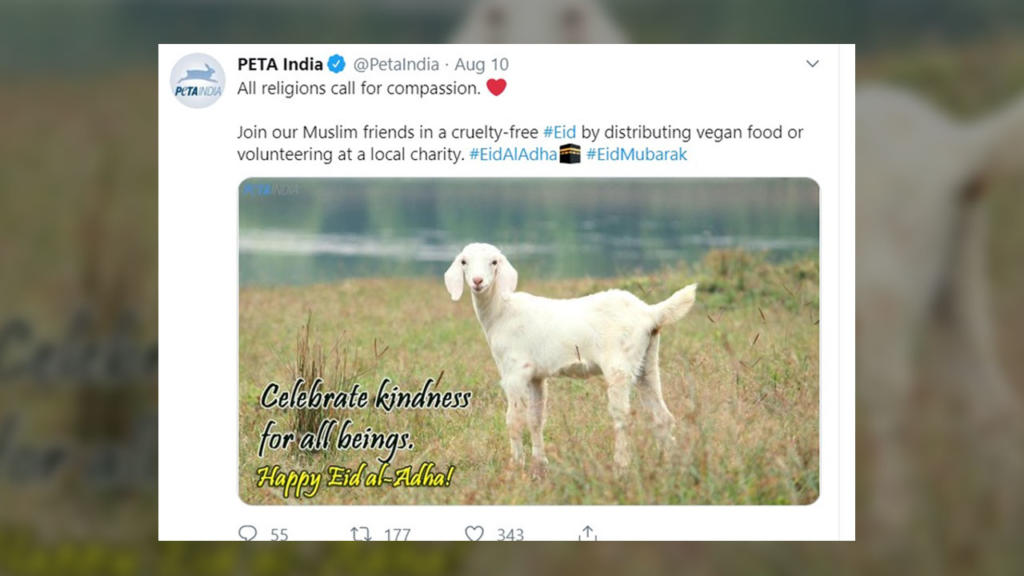Recently, People for the Ethical Treatment of Animals (PETA) tweeted a video from Mumbai’s Deonar slaughterhouse which unmasked the heart-wrenching cruelty that was being meted out to animals which were brought to the slaughter house for Eid. Posting this video, PETA tweeted, “BREAKING! PETA India visited Mumbai’s Deonar slaughterhouse where tens of thousands of animals have arrived to be sold for Eid. This is what we found. You will be shocked to see this!”
https://twitter.com/PetaIndia/status/1160084071784972288
Deonar is considered as one of the biggest slaughter houses in Asia. The video released by PETA captures scenes of dead buffaloes being moved around by a bulldozer, a shed full of dead goats, buffaloes and sheep. Moreover, the video also records an admission by a worker about how animals are kept in tightly packed spaces during transportation for 3 to 4 days at a trot and how many of the animals routinely die in transit.
PETA also wrote to the Maharashtra government demanding inspection of the Deonar slaughterhouse after the video capturing horrifying cruelty on the animals in the run up to Eid came in limelight. The letter, a copy of which was also sent to the Mumbai police, Brihanmumbai Municipal Corporation, Maharashta State Animal Welfare Board, Society for Prevention of Cruelty to Animals, Animal Welfare Board of India and the Food Safety and Standards Authority for India also called upon the concerned agencies to tighten the enforcement of laws dealing with transportation and slaughter of animals at the slaughter house.
As per Mumbai Mirror, over 1.24 lakh goats, sheep and about 2,700 buffaloes, were brought to the Deonar facility from Gujarat, Madhya Pradesh, Rajasthan, Uttar Pradesh and Assam for slaughter in the run up to Eid al-Adha on August 12. PETA requested Muslims not to offer animal sacrifice during Eid and distribute vegan foods instead. It also suggested volunteering for charities or taking other options that do not involve killing animals. Dr Manilal Valliyate, PETA India CEO and veterinarian, said, “All religions call for compassion, and no religion requires eating meat.”
While PETA has taken a laudable step by bringing in focus, the kind of cruelty that is inflicted on animals at the slaughter houses, it has fallen short of demanding a ban on sacrifice of animals. It must be noted that when it came to Jallikattu festival in Tamil Nadu, PETA had fought tooth and nail for a ban on the practice. A massive protest had taken place in Tamil Nadu which led to an amendment in the Prevention of Cruelty to Animals Act, 1960 to ‘preserve the cultural heritage of the state’ in 2017. 2019 is the second year when Jallikattu has taken place legally. PETA has documented a 75-page report with visuals from several places and has demanded a ban on Jallikattu yet again. It must be noted that after the state government has passed an amendment to nullify the ban on Jallikattu, PETA had taken the matter to the Supreme Court, showing its firm commitment.
While PETA has been relentless in demanding a ban on Jallikattu and also waging a legal battle for the issue, it has taken a rather diffident stand on the issue of cruelty meted out to animals ahead of Eid. It merely appealed to the conscience of the people and requested the state government for stricter enforcement of laws. In case of Jallikattu however, PETA had demanded a ban straightaway instead of appealing to conscience. In fact, PETA was at the forefront of a legal battle against the traditional practice. This is a clear case of double standards in PETA’s activism. One cannot fathom why PETA is trying to solve the issue of cruelty on animals by appealing to conscience of people instead of demanding a ban and waging a legal battle.
